
| |
Volume 3, Number 75 |
|
"There's a Jewish story everywhere" |
|
Today's Postings:
Monday, March 30, 2009
{Click on a link to jump to the corresponding story. Or, you may scroll leisurely through our report}
|
INTERNATIONAL
Power, it seems, goes literally and chemically to one's head ... by Rabbi Dow Marmur in Jerusalem
Lord David Owen was the leader of Britain’s third political party (SDP) in the 1980s. He’s also a medical doctor with training in psychiatry. Together with a psychiatrist from Duke University he has just written a scientific paper in the medical journal Brain which is due to be debated at a conference in June. READ MORE
Florida lawmakers excise 'shylock' as 'loan shark' synonym ... by Danny Bloom in Chiayi City, Taiwan.
As Shakespeare scholars, legal pundits and lawyers around the nation know by now, Florida has a law on its bookthat uses the words "shylock" and "shylocking" as legalese for loan sharks and loan sharking. But all that is to change on July 1 ... READ MORE
Sha'ar Hanegev teacher lectures U.N. on human rights ... by Shomtsion Cohen in Geneva, Switzerland
My name is Shlomtsion Cohen. I live in southern Israel, about 700 m from the boarder with Gaza. I work as a teacher in Shaar Hanegev primary school, near the town of Sderot. READ MORE
JUDAISM
The many ways you can tell Pesach is coming to Israel ... by Judy Lash Balint in Jerusalem
For the past several years I've been putting out a light-hearted '18 Ways You Know Pesach is Coming In Israel' piece to describe the frenetic days leading up to Pesach in the holy city.
This year, there are a few additional notable events that are driving the news cycles over here. READ MORE
Matzah, Matzah, Matzah ... a children's story for Pesach by Sonia Snyder in San Diego
"Attention, everyone!" Zaydeh's voice boomed as he magically pulled a matzah out of a shiny bag. "This is the afikomen, the dessert we'll eat at the end of our Passover seder. I'm going to carefully break it in half and wrap it in this napkin. Then later tonight, Bubby will hide it, and whoever finds it will get a prize."READ MORE
Perfecting the world by perfecting oneself ... by Michoel Stern in South Fallsburg, New York
When we take a look at the investment of time and resources the Jewish community puts into the cause of Tikkun HaOlam (repairing the world) we gain an appreciation of how projects under the banner of Tikkun HaOlam have a central focus in our community dedicated to them. READ MORE
LIFESTYLES
Something about this baby shower just wasn't right ... by Sheila Orysiek in San Diego
As I have described in previous articles the Bella Family Circle membership was composed of the descendants of Great Grandmother Bella and the people who married them. When I was young there were approximately seventy five members with about forty attending the monthly meetings at any one time.READ MORE
ARTS
Pakistani Muslim, American Jew offer peace serenade ... by Eileen Wingard in La Jolla, California
Yale Strom on violin and his band Hot Pstromi joined forces with his friends, Pakistani rock singer and guitarist Salman Ahmad, and Indian tabla virtuoso Samilr Chatterjee, in a program of musical symbolism and hope called Common Chords, a celebration of Jewish and Muslim music. READ MORE
ADVENTURES IN SAN DIEGO JEWISH HISTORYDecember 12,1952; Southwestern Jewish Press
UJF Jumps Gun On Campaign ‘53 READ MORE
Community Currents READ MORE
Beth Israel Sisterhood READ MORE
Go to top of right column |
|
Winter Day Camp Sets Dec. 15 for Registration READ MORE
J.W.V Aux. Get Special Nat’l Award READ MORE
JEWISH INTERNET FAVORITES
We continue our examination of Jewish entertainers
Herschel Bernardi in the title role of TV series "Arnie"VIEW VIDEO
Larry Blyden in the title role of "What Makes Sammy Run?"VIEW VIDEO
Lloyd Bochner as Chambers in "To Serve Man" on Twilight Zone VIEW VIDEO
Theodore Bikel in "A Dog of Flanders"VIEW VIDEO
Bonus videos
Yale Strom and Elizabeth Schwartz in joint performanceVIEW VIDEO
Salman Ahmad and Junoon in New York's Central Park VIEW VIDEO
STAFF BOX
Sara Appel-Lennon is planning a Nice vacation--literally. Nice on the French Riviera. Bon voyage, notre amie!
TODAY'S ADVERTISERS
America's Vacation Center
Anti-Defamation League
Balloon Utopia
Carol Ann Goldstein
Congregation Beth Israel
Jewish Family Service
Lawrence Family JCC
San Diego Community Colleges
San Diego Jewish Academy
San Diego Jewish Chamber
Seacrest Village Retirement Communities
Soille San Diego Hebrew Day School
Tifereth Israel Synagogue
United Jewish Federation
XLNC-1 Radio
DEDICATIONS
Each day's issue may be dedicated by readers—or by the publisher—in other people's honor or memory. To see today's dedications, please click here. Past dedications may be found at the bottom of the index for the "Adventures in San Diego Jewish History" page.
NOTE
PLEASE HELP US POLICE THIS SITE: If you see anything on this site that obviously is not in keeping with our mission of providing Jewish news and commentary, please message us at editor@sandiegojewishworld.com, so that we can fix the probem. Unfortunately, large sites like ours can be subjected to tampering by outsiders. Thank you!
EMAIL HEADLINE SERVICE
|
|
|



FROM THE SIDELINES
Power, it seems, goes literally and chemically to one's head
|
By Rabbi Dow Marmur
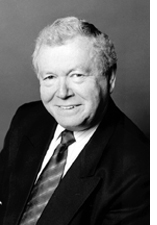 JERUSALEM--Lord David Owen was the leader of Britain’s third political party (SDP) in the 1980s. He’s also a medical doctor with training in psychiatry. Together with a psychiatrist from Duke University he has just written a scientific paper in the medical journal Brain which is due to be debated at a conference in June. JERUSALEM--Lord David Owen was the leader of Britain’s third political party (SDP) in the 1980s. He’s also a medical doctor with training in psychiatry. Together with a psychiatrist from Duke University he has just written a scientific paper in the medical journal Brain which is due to be debated at a conference in June.
The thrust of their findings is that what the ancient Greeks called hubris – an act of arrogance and presumption that offended the gods – is an occupational hazard for those in power, particularly, but by no means exclusively, prominent politicians and bankers. Lord Own cites several examples from Britain and elsewhere.
He believes that power goes, literally, to your head. The London daily The Guardian quotes him saying that “one day… scientists may prove a shift in brain chemistry.” He admits to having himself been touched by the syndrome and that he was helped by his wife’s corrective and mature influence. Every person in a prominent position needs a loving spouse to help her/him stay in touch with reality.
The Guardian lists the following symptoms described in the paper:
*A narcissistic propensity to see one’s world primarily as an arena in which to exercise power and seek glory.
*A disproportionate concern with image and presentation.
*A messianic manner.
*Excessive confidence in own judgment and contempt for advice.
*Exaggerated self-belief, bordering on omnipotence.
*A belief that one is accountable solely to history or God.
*Loss of contact with reality; often associated with progressive isolation.
*Restlessness, recklessness and impulsiveness.
The only way of relieving these symptoms, it seems, is public opinion and parliamentary democracy, though neither has been sufficiently effective so far. Lord Owen: “Because a political leader intoxicated by power can have devastating effects on many people, there is a particular need to create a
Go to top of right column
|
|
climate of opinion that political leaders should be held more accountable for their actions.”
Having been distressed and perplexed by recent events in Israel, I’ve been greatly helped by the above. It has helped me to understand why people in power are prepared to blatantly violate the law of which they themselves are supposed to be the custodians, and punish their own dissenting former supporters. It also makes it clear how important the judiciary and the police have been in curbing the seemingly insatiable desire of politicians to get ahead. No wonder politicians so often despise judges and cops.
I now understand better why the police must continue to investigate the outgoing Israeli prime minister Ehud Olmert for corruption and the previous president Moshe Katzav for rape and related charges; and why the investigation of the incoming foreign minister Avigdor Lieberman on money laundering is so important. The indignation of many members of Israel’s Labor Party with their leader also makes sense, for to stay in power he made common cause with Labor’s political arch-foes.
Translating Lord Owen’s findings to the situation here reminds me that Israelis are like everybody else but, in this and many other cases, unfortunately only more so.

|
|
|

THE JEWISH CYBERSURFER
Florida lawmakers excise 'shylock' as 'loan shark' synonym
|
By Danny Bloom
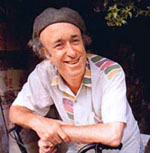 CHIAYI CITY, Taiwan -- As Shakespeare scholars, legal pundits and lawyers around the nation know by now, Florida has a law on its bookthat uses the words "shylock" and "shylocking" as legalese for loan sharks and loan sharking. But all that is to change on July 1,according to the Associated Press news bureau in Tallahassee, when the CHIAYI CITY, Taiwan -- As Shakespeare scholars, legal pundits and lawyers around the nation know by now, Florida has a law on its bookthat uses the words "shylock" and "shylocking" as legalese for loan sharks and loan sharking. But all that is to change on July 1,according to the Associated Press news bureau in Tallahassee, when the
state of Florida will officially strike those offensive words from The Merchant of Venice from all state documents.
According to sources deep within the Florida state capitol building,"the new law will go into effect on July 1. Florida Senate Bill 316will take care of this mishugas.
Here is a link with all the pertinent information on the bill.
Carlos A. Verney, Jr., who works as a legislative assistant in the office of Florida State Senator Eleanor Sobel, sent me a very kind letterexplaining the entire backstory and outlining the whole ugly history. It was a sad chapter in American legal history and come the 4th of July it will be history. Bravo!
As you know, the word "shylock" stems from a Jewish character namedShylock in William Shakespeare's rather anti-Semitic play from the16th century, titled The Merchant of Venice. The character in the play was a Jewish moneylender named Shylock (not a very Jewish-sounding
name) who demands a pound of flesh as repayment from a debtor.
Sen. Eleanor Sobel told this reporter that the new law "fixes themistake that has been left by history."
Sobel's measure first got a hearing on the Florida Senate floor, andwas among the first taken up during the 2009 legislative session this year.
This news ran as a regional state wire story on the Florida regional Associated Press wires recently and was reprinted in several Florida newspapers, but the AP did not sent the news on its national wire. A source in the Florida legislature says that the reason the Florida AP story did not go on the national wire is that "most state legislative news from
Go to top of right column
|
|
Tallahasee just goes on state wire and never goes national
unless it has national repercussions."
A Japanese man in Tokyo told me that the Japanese word for loan shark is "kori gashi" -- which to my ears sounds much better than "shylock." Sayonara "shylock". Good riddance.



|
|
|

GUEST COLUMN
Sha'ar Hanegev teacher lectures U.N. on human rights
|
By Shomstion Cohen
GENEVA, Switzerland--Following are the remarks of Shomstion Cohen on March 24, 2009:
Thank you Mr. President,
My name is Shlomtsion Cohen. I live in southern Israel, about 700 m from the boarder with Gaza. I work as a teacher in Shaar Hanegev primary school, near the town of Sderot.
Over the last 8 years, I have been living under a constant shower of rocket fire towards my home! Back home I’ve left my baby daughter, who was born into the unbearable reality of a never-ending threat to her very existence. She is only 18 months old and already has experienced the fall of rockets when she has only 15 seconds to find shelter; Shelter from rockets containing nails and ball bearings that can rip through metal and flesh.
The government of Israel has failed. Israel has more than just the right to protect me, it has the duty and obligation, and I demand and expect her to fulfill it. This may go against international public opinion, but the public does not live in my home, nor under the conditions that I live. One cannot speak of disproportionality when the Hamas continues to intentionally target me and my family, who are not military targets - while this council stays silent and gives them its implicit consent.
Mr President,
I am a teacher of children aged 11, who have never known any other reality but that of fear. 8 years of missile attacks have had a massive impact on a generation of young people. Bombs have fallen by their buses, in their schoolyards and in their villages.
In the midst of all this, I continue to teach my students acceptance of others, conflict resolution, and respect. I teach them not to avenge, not to hate but I do not believe that my Palestinian counterparts do the same. When I see armed children in the streets of Gaza, I fear that the opposite may be true.
Despite of all this, we turn to peace. I am here today, in the
Go to top of right column
|
|
belief that this council could protect my most basic human right, the right to life. I believe you could adopt a broader view of the suffering of both sides of the conflict. We implore the council to give us the help we need so that both sides may give a little in order to gain a lot.
Thank you Mr President

|
|
|

JERUSALEM DIARY
The many ways you can tell Pesach is coming to Israel
|
By Judy Lash Balint
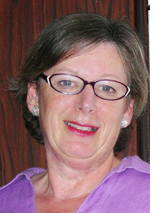 JERUSALEM--For the past several years I've been putting out a light-hearted '18 Ways You Know Pesach is Coming In Israel' piece to describe the frenetic days leading up to Pesach in the holy city. JERUSALEM--For the past several years I've been putting out a light-hearted '18 Ways You Know Pesach is Coming In Israel' piece to describe the frenetic days leading up to Pesach in the holy city.
This year, there are a few additional notable events that are driving the news cycles over here.
Apart from the upcoming Mid-East visit of the Pope and the ongoing saga of whether Gilad Shalit will be home for Pesach, there's the controversy over the Chametz Law. Never heard of it? Well, since 1986, Israel has had a law on the books that forbids leavened products from being displayed in public during Pesach. For the duration of the holiday, supermarkets cover their shelves containing non-Pesach items with thick white paper, whether to abide by the law or to avoid causing further pain to customers suffering from bread withdrawal is not clear.
Last year all hell broke loose when a Jerusalem judge overturned the law (that no one had ever been charged with violating) opining that it's permissible to sell chametz, as long as it's not publicly displayed. Meanwhile, Haaretz revealed in a poll that 68 percent of the population answers 'no' when asked if they are planning on eating chametz during Pesach.
Citizens of southern Israel have far weightier concerns, as they face the prospect of a Passover under fire for the eighth year running. The ceaseless barrage of Kassam and Katyusha rockets toward our southern cities and surrounding western Negev kibbutzim has shattered any semblance of the 'enhanced security' we were promised by the 2005 Gaza pullout.
As if that weren't bad enough, almost all the former Gush Katif residents are still in temporary housing almost four years since their eviction. Many who moved into the vast and dismal caravilla camp of Nitzan, near Ashkelon are still unemployed and dealing with the emotional and psychological effects of displacement.
Meantime, on Pesach the extent of the dire poverty of hundreds of thousands of Israelis is exposed. Latest figures indicate that roughly 20.5% of Israeli families live below the poverty line. Moreover, 24.7% of Israel's residents and 35.9% of its children live in impoverished families. Families and the elderly form almost endless lines in every city around the food banks and soup kitchens that do their best to provide the basics necessary to celebrate the holiday. The Mesamche Lev group distributed 46,278 pairs of shoes to 10,200 needy families last week, while all the other voluntary social welfare organizations report unprecedented demand for their services this Pesach.
In every Charedi neighborhood during the week before Pesach, men and boys block the narrow streets with handtrucks piled high with sacks of carrots, potatoes, oranges and cartons of eggs--all courtesy of the Kimcha D'Pischa funds that funnel donations from abroad to the Charedi communities, specifically for Pesach food.
The tourists, largely oblivious to our problems are expected to descend on us with a vengeance. Most visible are the busloads of pilgrims from eastern Europe, Nigeria and an assortment of Asian countries--the Jews arrive in much smaller family groups, excited to be in Israel for one of the three pilgrimage festivals.
So, as the popular Israeli expression goes, "We overcame Pharoah, we'll overcome this too..." This year, as always, we'll celebrate Pesach, the festival of our liberation and the birth of the Jewish people as a nation in the hope that we'll soon merit a saner reality.
Meanwhile, for those who have read this far, here's an updated version of the 18 (now 20) Ways You Know Pesach is Coming To Israel:
1. The Israeli Army presses into service some 200 IDF chaplains including reservists, to commence the massive task of kashering the hundreds of kitchens, mess halls and eating corners used by soldiers all over the country.
2. Street scenes in Israel change every day before Passover according to what's halachically necessary: In the days before the holiday, yeshiva students wielding blow torches preside over huge vats of boiling water stationed every few blocks on the street and in the courtyard of every mikveh. The lines to dunk cutlery, kiddush cups and the like start to grow every day, and, at the last minute, blow torches are at the ready to cleanse every last gram of chametz from oven racks and stove tops lugged through the streets.
3. No alarm clock needed here--the clanging garbage trucks do the trick as they roll through the neighborhood every morning during the two weeks before Pesach to accommodate all the refuse from the furious cleaning going on in every household. Two days before the Seder there's the annual pick-up of oversized items and appliances. Dozens of antiquated computer monitors and old toaster ovens stand forlornly next to the garbage bins on their way to the dump.
4. The day before Passover, families replace the yeshiva students, using empty lots to burn the remainder of their chametz gleaned from the previous night's meticulous search. In vain, the Jerusalem municipality sets up official chametz burning locations and issues strict orders banning burning in any other areas. Yeah, right!
5. Most flower shops stay open all night for the two days before Pesach, working feverishly to complete the orders that will grace the nation's Seder tables.
6. Meah Shearim and Geula merchants generally run out of heavy plastic early in the week before Pesach. In a panic, I make an early morning run to the Machane Yehuda market to successfully snap up a few meters of the handy counter-covering material.
7. No holiday in Israel is complete without a strike or two. In years past the Histadrut Labor Union threatened to launch a general strike 10 days before the holiday to protest planned economic cuts. Ben Gurion Airport was included. This year, it's electric company workers who are out on strike...
8. Observant Jews mark the seven weeks between Passover and Shavuot by carrying out some of the laws of mourning--one of these is the prohibition against cutting hair.
Go to top of right column
|
|
Good luck if you haven't scheduled an appointment for a pre-Pesach/Omer haircut. You can't get in the door at most barber and beauty shops.
9. Mailboxes are full of Pesach appeals from the myriad of organizations helping the poor celebrate Pesach. Newspapers are replete with articles about selfless Israelis who volunteer by the hundreds in the weeks before the holiday to collect, package and distribute Pesach supplies to the needy.
This year, Hazon Yeshaya Soup Kitchens plan on serving 7,000 meals per day during Passover. More than 15,000 food parcels will be distributed before the holiday, just by this one organization. With thousands of newly-unemployed Israelis, every food distribution organization is stretched to the limit.
10. The biggest food challenge to those of us ashkenazic, non-kitniyot (legume) eaters is finding cookies, margarine etc. made without kitniyot, but an increasing number of ashkenazic rabbis are coming out with lenient rulings regarding legumes.
11. Since most of the country is on vacation for the entire week of Pesach, all kinds of entertainment and trips are on offer. Ads appear for everything from the annual Boombamela beach festival, kid's activities at the Bloomfield Science Museum and concerts in Hebron, the City of David, Sderot and the Dead Sea.
12. Pesach with its theme of freedom and exodus always evokes news stories about recent olim. This year, general immigration numbers are significantly down, but American aliya has enjoyed a mini-boom. For a couple of thousand new Israeli-Americans, it'll be their first Seder at home in Israel. Israel Radio announces that 700 prisoners will get a furlough to spend the holiday with family.
13. This just in: According to Israel's Brandman Research Institute study, 43 million people hours will be spent nationwide in Israel 's cleaning preparations for Passover this year. How does that break down? Of those cleaning hours, 29 million are done by women and 11 million by men. Persons paid to clean do the remaining 3 million hours at a cost of NIS 64 million ($15.6 million).
14. Israel's chief rabbis sell the nation's chametz to one Hussein Jabar, a Moslem Arab resident of Abu Ghosh and manager at Jerusalem's Renaissance Hotel. Estimated worth: $150 billion secured by a down payment of NIS 20,000. Jabar took over the task some 14 years ago, after the previous buyer, also from Abu Ghosh, was fired when it was discovered his maternal grandmother was Jewish.
15. Radio commercials for all sorts of products and services are set to Seder melodies. Last year, Volkswagen used the Mah Nishtana tune to advertise its cars. Another favorite is "Echad Mi Yodeya?--Who Knows One?" that has become a jingle for one brand of coffee. "Four mothers, three fathers, two sugars, one cup of coffee!"
16. For those of us too lazy to go to our rabbis to sell chametz, one Israeli website offers the possibility of performing this ritual in cyberspace: For those of you out there with Hebrew enabled computers, take a look at this site.
17. Sign of the times? A few years ago, former Sephardi Chief Rabbi Mordechai Eliyahu issued a ruling that Viagra may be taken on Pesach provided the pill is encased in a special empty capsule so that the drug itself is not in direct contact with the body. In a move to ease another kind of Pesach yearning, the Israeli branch of Ben & Jerry's ice cream has developed Matza Crunch flavor. French vanilla with chips of chocolate-covered matza make up the new flavor, which is being sold for $4.50 a pint in Israeli supermarkets.
18. At the Kotel last week, I watched as workers performed the twice-yearly ritual (pre-Pesach and pre-Rosh Hashanah) of removing thousands of personal notes from the crevices of the Kotel to bury them on the Mt of Olives.
19. Guess Who's Buying Matza? According to Iyad Sharbaji, the manager of Gadaban Supermarket at the entrance to the the Galilee Arab town of Umm al Fahm, his Matza is consumed entirely by local Arabs. Sharbaji told Haaretz that he generally stocks up on Matza for Passover and has to replenish stock before the end of the holiday, due to keen demand by locals.
It turns out the avid consumption of matza is not a new trend in Arab towns and villages, whose inhabitants view the traditional Jewish food as nothing more or less than a welcome and refreshing change in the menu. "It's not a religious issue, and certainly not a political one," Sharbaji explains.
20. A sign of our economic times--supermarkets entice shoppers with a promise to allow us to settle up the bill in six equal monthly payments on the credit card. Yes, many of us will still be paying for the Seder come Rosh Hashanah!


|
|
|

Jewish Story Time
Matzah, Matzah, Matzah ... a children's story for Pesach by Sonia Snyder in San Diego
|
"Attention, everyone!" Zaydeh's voice boomed as he magically pulled a matzah out of a shiny bag. "This is the afikomen, the dessert we'll eat at the end of our Passover seder. I'm going to carefully break it in half and wrap it in this napkin. Then later tonight, Bubby will hide it, and whoever finds it will get a prize."
Josh eyed the wrapped matzah, chanting to himself. "I'm getting the prize tonight. I'm getting the prize tonight." Josh had a sure-fire plan. "As soon as Bubby takes the matzah out of the room, I'll grab my head and start whining. 'Mom! I was going to wear my brand new kipah tonight. It's on my dresser.' Mom will tell me to go get it. I'll rush out of the room. And then, I'll be able to sneak around and see exactly where Bubby is hiding the afikomen."
"Joshua, do you know how the Four Questions begin?" Zaydeh was looking at his youngest grandchild.
"Yes, I do!" Josh sat up tall. "It starts out…'Why is this night different from all other nights', and why do we eat matzah instead of bread?"
"Excellent, Joshua!" Zaydeh's face beamed. "Do you know the answers?'"
"Not really," Josh muttered as he opened his Haggadah. He knew lots of things about Passover. But right now he had only one thing on his mind. He glanced sideways around the room. The spot where the wrapped matzah had been was empty. "Oh no! The afikomen is gone and so is Bubby. She wasn't supposed to hide it this soon."
"I love matzah," grumbled Josh, his lips quivering. "I love it covered with butter. I love matzah balls and fried matzah. And I'd love this matzah game if I ever won. But now, what do I do? My matzah plan just got smashed into a million pieces."
He looked down at his open Haggadah, trying to hide a flood of salty tears. As Josh stared at the page, a huge picture of a matzah stared back at him. The tiny holes in the matzah were growing bigger and bigger, and the brown spots were melting together. The matzah was becoming a mysterious dark hole. And soon Josh was being pulled through the opening by what felt like a giant magnet.
"What's happening to me?"
He landed in a long room with high ceilings and carved pictures on the walls. A man was sitting on a red velvet throne and leaning comfortably against large fluffy pillows. The man was wearing a gold crown. "That guy must be a king. In fact, he looks just like the pictures of King Pharoah I saw in my Torah School books."
Standing next to the king were two men dressed in long robes. One of the men picked up a snake that was slithering across the ground. The snake wriggled for a moment and then, turned into a stick. "Let my people go!" demanded the man.
"Wow!' Josh gasped. "Could these guys be Moses and Aaron?" The king began shouting. "You've got to be kidding. Don't try your magic on me. I'm not going to let those Jews go free. I have too much work for them to do. Get out of here before my guards throw you in jail."
"You'll be sorry!" the men warned as they left.
Josh turned to follow the men, but all he could see was a crowd of screaming people. "We're so thirsty. There is nothing to drink. Our water is red like blood. And the river is filled with frogs."
Suddenly, swarms of frogs appeared, leaping everywhere: in trees, on people's heads and under rocks. Josh had to keep pushing their slimy, slippery legs off his body. It was terrible. Then as quickly as they'd come, the frogs were gone.
The sky began turning dark, even though it was the middle of a spring day "What's going on now?" Josh puzzled. "This is so weird."
He could hear crying and groaning. When the sun came out again Josh saw people trudging toward gigantic pyramids. Their bodies were bent under the weight of huge bricks. Other people were stacking the bricks. A man, scowling and swinging a whip, shouted at Josh. "Why aren't you working? Get over there right now and help those Jewish slaves slap mud between the bricks."
Go to top of right column
|
|
Josh's hands began shaking. He was wearing his good clothes, and it was boiling hot. "I'm not supposed …"
"Don't talk back. Just do as you're told," mumbled a nearby slave.
Josh tried to pick up a brick, but it was so heavy that he fell down and bumped his head. Quickly several people rushed over and dragged him away. "Please!" Josh cried. "Don't beat me or throw me in jail. I promise I won't lie or be sneaky anymore."
But Josh was being taken out to the desert where thousands of people were gathering. An old woman grabbed his arm. "Hurry up! We've got to cross the Red Sea before the Egyptians get here. They'll take us back to our bitter lives in Egypt and make us work harder than ever. You don't want to be a slave anymore, do you?"
"No! I would never want to be a slave. But," Josh complained, "my head hurts, and I'm hungry." "Well, the bread dough on my back has been baking in the sun. Eat some of that, but just keep moving."
Josh tasted a tiny piece of the dough. "Umm… This is real matzah!" It reminded him of the seder he was missing. "If I could get back home, I'd even eat matzah covered with horseradish."
The people in the desert pushed and shoved as they marched forward. It was so crowded. But finally everyone got to the other side of the Red Sea. Then they began dancing and singing. Everyone was singing. Zaydeh was calling. "O K. It's time to look for the afikomen."
Josh bounced up. The other kids were already searching everywhere for that special piece of matzah. Josh darted to the living room. He quickly checked behind the cushions on the sofa and chairs. Nothing! He looked under the dark stairs. He even checked the bathtub.
Then a picture of a brick pyramid flashed through his mind. Josh ran to the brick fireplace. There it was! "Zaydeh, I found it! Fair and square.''
Zaydeh handed Josh five dollars and a box of chocolate covered matzahs. Now it was Josh whose face was beaming. This night really was different from all other nights.
.
|
|
|

JEWISH THOUGHT
Perfecting the world by perfecting oneself
|
By Michoel Stern
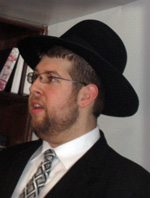 SOUTH FALLSBURG, New York—When we take a look at the investment of time and resources the Jewish community puts into the cause of Tikkun HaOlam (repairing the world) we gain an appreciation of how projects under the banner of Tikkun HaOlam have a central focus in our community dedicated to them. Indeed, one can easily see how the concept of Tikkun HaOlam has permeated the Jewish community due to its intrinsic value to the Jewish religion and mission. Yet, tragically, at the expense of a broader definition ... the word Tikkun HaOlam has become synonymous and limited to “social action.” SOUTH FALLSBURG, New York—When we take a look at the investment of time and resources the Jewish community puts into the cause of Tikkun HaOlam (repairing the world) we gain an appreciation of how projects under the banner of Tikkun HaOlam have a central focus in our community dedicated to them. Indeed, one can easily see how the concept of Tikkun HaOlam has permeated the Jewish community due to its intrinsic value to the Jewish religion and mission. Yet, tragically, at the expense of a broader definition ... the word Tikkun HaOlam has become synonymous and limited to “social action.”
I am not, G-d forbid, trying to mitigate the social action component to Tikkun HaOlam. Rather, I am pleading for the Jewish community to reassess our understanding of Tikkum HaOlam, and to gain a greater understanding of the concept. To achieve this goal I think it is essential for us to understand and define the traditional concept of Tikkun HaOlam, and how the concept of Tikkun HaMiddos (repairing character traits) plays a vital role in the implementation and achieving of a complete Tikkun HaOlam.
The idea of Tikkun HaOlam traditionally has been understood as changing the world for the better through the mitzvos (commandments) by accomplishing change in the spiritual realm with a cause and effect action that determines the landscape of the physical realm (world). This idea is expounded upon by Rabbi Chaim of Volozhin (Nefesh HaChaim 1:6) commenting on the verse in Leviticus (18:5) regarding the mitzvos: “And you shall live in them (the mitzvos).” People live "in a mitzvah” by effecting change in the spiritual realm through adherence to the mitzvos; this in turn empowers the physical world which is sustained by the spiritual realm they effected the change to. Therefore, people live in a physical world that they impact by their keeping the mitzvos. This is Tikkun HaOlam in its traditional sense.
Tikkun HaMiddos, a form of Tikkun HaOlam in its essence:
Leo Tolstoy said, “Everybody thinks of changing humanity and nobody thinks of changing himself.” I believe that if we would be more in tune to the role that Tikkun HaMiddos has in Tikkun HaOlam, and the goal of our existence in general, then we would focus more of our energy towards self-evaluation.
The Jewish texts are far from silent on this matter. They inform us, unequivocally, that perfection of one's character is the purpose and anchor to our mission on this world. In the introduction to the classic mussar (discipline of character refinement) of text, The Orchos Tzadakim, we are told: “And if you do not have good traits, you do not have Torah and mitzvos, for all of Torah hinges upon the perfection of one's traits.”
In the Vilna Goan's master piece on mussar, Evan Shelimah (1:1-2) he informs us: “All service of G-d is dependent upon correcting character traits … The main obligation of a person is to constantly strengthen their struggle with their character. If not, why [did G-d] give him life?” The Baal Shem Tov (commenting on Genesis 1:26) explains how a person is a “partner” with G-d in bringing his or her own potential into fruition through using free will. G-d created humanity with the potential to obtain spiritual greatness,
Go to top of right column
|
|
however, only we can harness our free will to accomplish our Divinely given task.
Rabbi Chaim Freedlander zt”l (in Sifsei Chaim-Middos V'avodas Hashem vol. 2 Pg. 17) shares a profound meaning if the mishneh in Pirkei Avos (1:14) where Hillel said: “If I am not for myself, who will be for me?” What Hillel was saying is that each person is unique in the abilities he has been given and what position in life he has been put. Only they, and nobody else, are capable of achieving their purpose in the world utilizing what they were given. It should be abundantly clear that perfection (or the pursuit) of character refinement is a form of Tikkun HaOlam in its purest sense. The pursuit of character refinement leads to repairing the world in its physical and its spiritual manifestation. Tikkun HaMiddos as a vehicle to enhance Tikkun HaOlam:
Rabbi Yisroel of Salant once said: “It is easier to learn all of the Talmud than to change one bad character trait.” I think this quote could be modified to fit our context by saying that, “It is easier to attend sixty marches and serve at forty soup kitchens than it is to have the brutal honesty to assess our Tikkun HaMiddos.” Psychologically being involved in causes for others is more easily addressed than our own introspection.
However, when we take the initiative to repair ourselves we are in a better position to help others. People often get in and out of social action fads, but by instilling the intrinsic value of kindness as an opportunity to emulate G-d we can be better motivated to be more committed to the task at hand. Rabbi Avigdor Miller zt”l lays out this important premise in kindness when he observes that in the episode where Abraham was circumcised, G-d made the weather very hot to advert guests from coming to his tent while he was recovering. However, because Abraham was bothered by not having guests G-d brought angels to visit him (see Rashi to Genesis 18:1). Rabbi Miller asked, what was bothering Abraham? There were no guests to be had because the weather was so horrible, so no one needed his kindness.
Rabbi Miller said Abraham was greatly agitated at the lack of opportunity in emulating G-d through doing kindness, this is what pained him!
The skills one develops by working on Tikkun HaMiddos contributes immensely toward team work and a more effective personal contribution as well. Pragmatically, when we are better people, we will be better liked, and this will enable us to make a larger impact in our efforts toward social action. Thomas Szasz (in the Second Sin) points out that,“People often say that this or that person has not yet found himself. But the self is not something that one finds. It is something one creates.”
Let us, with G-d's help create ourselves so that we can make the best tikkun (repair) possible in everything that it entails.
|
|
|

REFLECTIONS
Something about this baby shower just wasn't right
|
By Sheila Orysiek
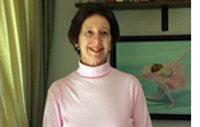 SAN DIEGO—As I have described in previous articles the Bella Family Circle membership was composed of the descendants of Great Grandmother Bella and the people who married them. When I was young there were approximately seventy five members with about forty attending the monthly meetings at any one time. Dues had originally been set at $.50 per adult per month and gradually rose to $2.00 by the early 1960’s and was used to defray expenses for the Passover Seder, the Trip to the Shore, the Picnic as well as cards sent for birthdays, get well wishes, etc. It did not include the door prize; this was provided by the host family. A monthly bulletin was sent out by Cousin Annie, our beloved Sunshine Chairman and included a cleaned up version of what had happened at the meeting as well as any additional family news. SAN DIEGO—As I have described in previous articles the Bella Family Circle membership was composed of the descendants of Great Grandmother Bella and the people who married them. When I was young there were approximately seventy five members with about forty attending the monthly meetings at any one time. Dues had originally been set at $.50 per adult per month and gradually rose to $2.00 by the early 1960’s and was used to defray expenses for the Passover Seder, the Trip to the Shore, the Picnic as well as cards sent for birthdays, get well wishes, etc. It did not include the door prize; this was provided by the host family. A monthly bulletin was sent out by Cousin Annie, our beloved Sunshine Chairman and included a cleaned up version of what had happened at the meeting as well as any additional family news.
Over the decades the BFC changed. The era of successive Uncles serving as President, Vice President and Treasurer, gradually gave way to include the Aunts. While every office holder was chosen by means of a thoroughly democratic election (one member/one vote), it went without saying that each Patriarch and Matriarch would be elected in chronological order. But as time took its toll, the First Cousins began to assume the mantle of authority.
This organized structure served the family well in more ways than simply meeting and enjoying one another. Generally, as families expand through succeeding generations cohesion tends to splinter, but the BFC has been able to stave off this attrition. It also provided an opportunity for sustained contact as children grew into adults, as our seniors became frail, and as the family weathered the trials and tribulations that invariably come to all of us.
It is much more likely that family members more distant from the basic nuclear family unit will respond with help when those members see one another once a month. The contretemps that normally arises between various members (who is/is not happy with whom), tends to melt away in the face of actual need. How can one refuse to take Aunt Matilda to the hair dresser because her gray roots are showing, even though there are fourteen inches of snow on the ground when one knows Aunt Matilda will be at the BFC meeting next Sunday? How guilty would one feel if she has to wear a scarf over her head at the meeting?
The guest list for a Bar/Bat Mitzvah, wedding or other simchas was already set - just check the mailing list for the BFC Bulletin. There was never a worry about being able to convene ten men (this was before women were counted as human beings) for a Minyan to sit Shiva. No one had to be embarrassed with only a few people in attendance at a funeral - the entire family came.
There were other serious occasions when the extended family rushed to intercede and then stayed to help in a sustained fashion. When Cousin Betty’s husband was struck with MS, and she had to raise two rambunctious young boys with scant resources, the family convened to discuss the situation and to offer suggestions for long term care and material help. Some of that help could have been provided by no one else except caring relatives. Those two young mischievous boys paid little attention to the discipline of their tired mother when she returned after a day’s work. So, at strategic intervals an Uncle or a male Cousin would appear to give the boys a dose of male role modeling and an infusion of male discipline. As a result each boy turned out to be a stellar member of both the family as well as the larger community.
Go to top of right column |
|
When other situations arose and one needed a good reference to a doctor, lawyer or accountant; someone in the family would recommend such a person not just by reputation but by actual experience. This was also true for car mechanics, household help, etc. And occasionally an Uncle would intervene if a contretemps threatened to splinter family cohesion. In addition a fund of money was available for emergencies and of course there was always plenty of advice - asked for or not.
Sometimes the BFC would combine both prankish humor and a celebratory occasion. When Cousin Julie announced she was “expecting” (under “New Business”) there were many “Mazel Tov’s”. However, late in her pregnancy she was confined to bed rest. This upset a scheduled baby shower that had been planned for her. Nevertheless, it was decided to go ahead with the shower after the conclusion of a regular BFC business meeting. So, we each turned up with a baby gift properly wrapped in baby shower paper, complete with ribbons and bows. Both Aunt Rose, The Elder, and Aunt Rose, The Younger, were the sponsors of the baby shower. “Elder” meant she had married earlier into the family - not because she was older in years (heaven forefend) - although she was.
Since Cousin Julie couldn’t attend (bed rest, remember?), I was asked to unwrap the gifts for her. I was surprised since as a lowly Second Cousin I didn’t think anyone had even noticed I was there (when it came to wedding and Bar/Bat Mitzvah invitation lists, I never was “there”). I was also preoccupied by the fact that my fiancé was present and my thoughts were not totally concentrated on “New Business” versus “Old Business.” But always happy to help (and hugely flattered to get noticed), I seated myself in the midst of the gifts and began to open them.
The first was a set of towels. The second was two lovely throw rugs. I thought these were rather unusual gifts for a baby - but who knows - maybe the baby needs throw rugs and surely will eventually need towels. Next a box with a set of kitchen utensils - definitely not a baby type of thing. When the next gift was a toaster, it did seem rather strange - even to me stuck in my starry eyed bride-to-be heaven.
Though I was puzzled, my low status of Second Cousin had taught me to go with the flow. If the Aunt Roses (both The Elder and The Younger) planned this shower and these were the gifts people wanted to give a baby, I wasn’t going to argue. The gift I had brought the baby-to-be was the only proper baby gift thus far.
Slowly as people began to giggle I realized that somehow something wasn’t quite kosher. And finally - well after I should have - it dawned on me that this was a surprise wedding shower for me! Me! The invisible Second Cousin who never strayed outside her status - who knew her place - didn’t always relish it - but nevertheless never challenged it - who watched the First Cousins from a respectful distance - who regarded the Uncles and Aunts with proper awe - this time I was actually the center of the action.
It was the first time I truly felt that someone even knew my name. I subsequently discovered, however, that this event didn’t alter my lowly Second Cousin status when it came to wedding/bar/bat mitzvah invitation lists.
Cousin Julie wasn’t forgotten either - the shower for her happened the next month when both she and the baby were able to attend. And, thank you to both Aunt Roses’ who planned that wonderful bridal shower for me.
|
|
|

CONCERT REVIEW
Pakistani Muslim, American Jew offer peace serenade
|
By Eileen Wingard
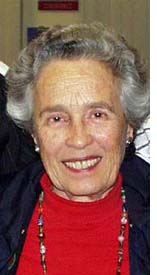 LA JOLLA, California— Yale Strom on violin and his band Hot Pstromi joined forces with his friends, Pakistani rock singer and guitarist Salman Ahmad, and Indian tabla virtuoso Samilr Chatterjee, in a program of musical symbolism and hope called Common Chords, a celebration of Jewish and Muslim music. LA JOLLA, California— Yale Strom on violin and his band Hot Pstromi joined forces with his friends, Pakistani rock singer and guitarist Salman Ahmad, and Indian tabla virtuoso Samilr Chatterjee, in a program of musical symbolism and hope called Common Chords, a celebration of Jewish and Muslim music.
This March 25th presentation was the second program of the 10th Annual San Diego Jewish Music Festival at the Lawrence Family JCC.
Peace was the theme of many of the songs, such as John Lennon’s "Imagine" and Yale Strom’s concluding song, "What Time Will It Be," sung with committed fervor by deep-voiced Elizabeth Schwartz, Strom’s talented wife.
This song was Strom’s latest, quoting Theodore Herzl’s "If you will it, it is not a dream." Herzl uttered these words to inspire the realization of the Zionist dream, a Jewish homeland in what was then Palestine. Strom uses the words to inspire the realization of world peace. "If you love your sons more than you love your guns," was one of Strom’s .lines.
Salman Ahmad’s strong voice and confident guitar playing rendered songs with lyrics by various Sufi poets. "You may break my mosque, but do not break my heart," wrote one. In another song, Ahmad had the entire audience responding with the chorus. Ahmad, a medical doctor turned rock star, is the founder of South Asia's biggest rock band, Junoon. It has sold over 25 million albums worldwide.
As Strom and Ahmad took turns leading songs from their cultures, the other musicians on stage (Schwartz, Chatterjee, Gunnar Biggs, double bass, Lou Fanucchi, accordion) joined in with accompaniments or solo improvisations. Schwartz even did some choreography to Ahmad’s music.A highlight was Hot Pstromi’s the "Berditshever Khosid" which included "V’taher libenu" (Purify our hearts), and when Strom’s group played
Go to top of right column |
|
the "Kolomeyke," many audience members came down to dance. The vivacious Jackie G’mach, program director of the Lawrence Family JCC, encouraged members of the audience to join in.
There was a nice representation of young people in the audience. Among them were five Hebrew High School brought by Carla Grossmann; Paula Siegel’s 19 year old grandson Max Siegel, a freshman at Berkeley studying film, and Mitchell Simon’s 13-year-old son Zachary.
The program was co-presented by the Jewish Studies Program at San Diego State University where Strom is Artist-In-Residence. Dr. Risa Levitt-Cohn, director of the Jewish Studies Program and the brilliant curator of the Dead Sea Scrolls Exhibit at the Natural History Museum (2007) introduced the evening..
Common Chords has received national recognition. It was presented several months ago at Queens College in New York where Strom and Ahmed began their friendship, and it was written up as part of an article in a recent Hadassah Magazine profile on Strom.
Here are Yale Strom and Elizabeth Schwartz in another performance found on YouTube:
Below, in a slightly wider format, is Salman Almad with his band Junoon at a recent conference in Central Park in New York City:
|
|
|
Salman Ahmad and Junoon in New York's Central Park

Adventures in San Diego Jewish History
|
UJF Jumps Gun On Campaign ‘53
Southwestern Jewish Press December 12, 1952, page 1
Showing complete confidence in the Jews of San Diego and in the 1953 Combined Jewish Appeal, the Board of Directors of the United Jewish Fund authorized the forwarding of $15,000 in cash to the National Conference of the United Jewish Appeal, to be held on December 12th in New York City, as an advance on the 1953 Campaign according to Murray D. Goodrich, President of the Fund.
In forwarding the Fund’s check to Dr. Joseph J. Schwartz, Executive Director of the United Jewish Appeal, Mr. Goodrich stated, "It is with a great deal of pleasure that we forward to you the enclosed check in the sum of $15,000 as an advance to the United Jewish Appeal on our 1953 Campaign. Our only regret is that because of previous commitments and needs that must be met immediately, we cannot forward, at this time, a larger amount.”
Besides the $15,000 which has just been forwarded on the 1953 Campaign, the United Jewish Fund has forwarded to date out of the 1952 drive $81,350 as partial payment on a $120,000 commitment. The balance of the money will be forwarded as pledges are converted into cash by contributors in the 1952 Campaign.
Harry Mallen, Chairman of the Collection Committee urges everyone who pledged and has not as yet paid to make their payment before the end of the year.
Community Currents
Southwestern Jewish Press December 12, 1952, page 2
By Albert Hutler, Director, United Jewish Fund
The first activity in the new Community Quarters at 3227 El Cajon Blvd. was a meeting of the new Board of Directors. As I looked over the 30 men and women present I knew what Sol Stone, former Director of United Jewish Fund, felt when he said, “He was so happy to see the beginning of his dream realized.” It was also the beginning of my hope.
Present at the meeting were not only members of the three synagogues who are on the Board, but men who hold office in each congregation; a president of one, and vice-president of the other two. Also there were individuals who do not belong to any congregation, but who wish to participate in other forms of Jewish communal life. Here truly did we find a common meeting ground.
One of the men, who must have felt a glow of justifiable pride in this opening meeting of the first Center quarters in San Diego, was Morrie Douglas, who along with Eli Levenson has probably done more than any other individual to keep the Center movement alive and breathing. As president and then the first vice-president, it was his will and his efforts as much as anything that kept us from giving up the fight. We who believe in the Center owe gratitude to this fine, sincere community leader, and to the work that he has done on behalf of all of us.
New blood has been brought into the stream of community life by the election of Herbert Haimsohn, Center President. A young man who has lived in San Diego all his life, has now assumed leadership in our community. That’s a good sign for the future of our Jewish community in San Diego. New leadership keeps us from getting smug and satisfied; young leadership keeps any movement dynamic. If all of us who are interested in the Center movement get behind Herb and work with him, there is no question but that we shall achieve a Center of which we can be proud in the next few years.
Attack On Public Schools
With the PTA and the Board of Education voting in favor of keeping the UNESCO film as part of the school curriculum, the attack on the schools system in San Diego using UNESCO as its focal point, has evidently failed. But generals say that you can lose a battle, yes many battles, and still win the war.
Therefore, it is imperative that all who believe in freedom of education should watch and be observant. We cannot afford to let our guard down for even one moment. That’s the way fundamental liberties are lost.
Last week the Community Relations Council in cooperation with the Civic Unity Council sponsored a luncheon at which Max Birnbaum, Director of the American Jewish Committee’s Intercultural Education Division and an authority on the attack on public schools throughout the United States, answered questions. Represented at the meeting were members of the Board of Education School Administrators, PTA Leaders, Women Club Leaders, Church Leaders, and many others who are interested in the coincidence of attacks throughout the United States.
It was a most interesting and informative meeting and the Community Relations council was congratulated by all those present for having it.
1953 Campaign
Plans are already under way for the 1953 Combined Jewish Appeal which will again begin its organizational phase in early March and open on April 1, 1953. All organizations are asked to keep these dates in mind, especially the month of April and the first two weeks of May, in planning their affairs for 1953.
Go to top of right column
|
|
Beth Israel Sisterhood
Southwestern Jewish Press, December 12, 1952, page 3
Temple Beth Israel Sisterhood will hold its last meeting for 1952 on Monday, December 29th at 11:45 a.m. in the Temple Center. Program co-chairmen Mrs. M.D. Goodrich and Mrs. Morton Cohen have arranged a unique program titled “Turn-About” in which children of sisterhood members will take over the complete meeting. Those participating will be: Elsa Esterson, Barbara Silverman, Judy Smollar, Preston Martin, Marcia Ruskin, Ronda Esenoff, Sharlene Stone, Paul Kaufman, Morton Cohn, Jr., Brenda Heiman, Sheila Lipin, Harriet Silverman, Adrian Sachoff, Janet Solof, Jack Felson, Alan Friedman, Nelson Guyer, Andy Ratner, Gordon Leavitt, Jeremy Lustig, Dick Godes, Burt Sharpe, Aaron Kolkey, Jane Cohn, Joyce Addleson, Linda Solof, Terry Kitaen, Jack Sharpe, Esther Lustig, Juday Hertz, Rochelle Goodrich, Arthur Pogrell, Susie Hutler, Susan Solof.
There will be a full length movie and treats for the youngsters. Sisterhood members will exchange 25 cents Chanukah gifts. Luncheon captain for this affair is Mrs. Charles Silverman. For reservations, phone Mrs. John Ruskin, Mrs. J. Alweis.
On Sunday, November 9 Temple Beth Israel Sisterhood held a Sunday nught supper at which the following numbers in a raffle have been unclaimed: Nos. 016543, 016742, 016433, 016582, 016520, 016609, 016768, 016493, 016414, 016747, 016754, 016736.
Winter Day Camp Sets
Dec. 15 for Registration
Southwestern Jewish Press. December 12, 1952, page 3
Monday, December 15th is the last day for registering youngsters (5-12) for the Camp Jaycee “Winter Vacation” Day Camp. Inasmuch as the day camp will be using the new center facilities at 3227 El Cajon Blvd., registration is limited to 50 youngsters. The program will begin Monday, December 22nd and will operate for 8 days ending Friday, January 2, 1953.
Faster pickup and delivery service is being arranged so that travel time will be within 25 minutes. Scheduled are relaxing activity programs featuring camp council, arts and crafts, dramatics and a camp newspaper. The camp will furnish milk and refreshments to the campers own lunch.
J.W.V Aux. Get Special Nat’l Award
Southwestern Jewish Press December 12, 1952, page 3
Mrs. Binnie Brooks, Pres.
Auxiliary No. 185, J.W.V.
7254 Fulton St.
San Diego 11, Calif.
Dear Madam President:
It was with a great deal of pleasure that we forward to you the enclosed citations issued by the national Ladies Auxiliary at the recent convention in Atlantic City.
Without a doubt, your record of achievement merits such citation. With all best wishes.
Loyally,
Dolores Brown, President
Dept. of California
Ladies Auxiliary, J.W.V.
National Ladies Auxiliary
Jewish War Veterans of the U.S.
Editor's Note: The citation read: In Recognition of
Outstanding Service In U.S. Naval Hospital awarded to
San Diego Auxiliary 185, November 17th, 1952. Fannie E. Brannick, Chairman; Jessica Slatis, President


|
|
|
Return to top

Jewish Internet Favorites ... featuring notable Jewish community members*
|
< BACK TO TOP
|

 JERUSALEM--Lord David Owen was the leader of Britain’s third political party (SDP) in the 1980s. He’s also a medical doctor with training in psychiatry. Together with a psychiatrist from Duke University he has just written a scientific paper in the medical journal Brain which is due to be debated at a conference in June.
JERUSALEM--Lord David Owen was the leader of Britain’s third political party (SDP) in the 1980s. He’s also a medical doctor with training in psychiatry. Together with a psychiatrist from Duke University he has just written a scientific paper in the medical journal Brain which is due to be debated at a conference in June.
 CHIAYI CITY, Taiwan -- As Shakespeare scholars, legal pundits and lawyers around the nation know by now, Florida has a law on its bookthat uses the words "shylock" and "shylocking" as legalese for loan sharks and loan sharking. But all that is to change on July 1,according to the Associated Press news bureau in Tallahassee, when the
CHIAYI CITY, Taiwan -- As Shakespeare scholars, legal pundits and lawyers around the nation know by now, Florida has a law on its bookthat uses the words "shylock" and "shylocking" as legalese for loan sharks and loan sharking. But all that is to change on July 1,according to the Associated Press news bureau in Tallahassee, when the




 JERUSALEM--For the past several years I've been putting out a light-hearted '18 Ways You Know Pesach is Coming In Israel' piece to describe the frenetic days leading up to Pesach in the holy city.
JERUSALEM--For the past several years I've been putting out a light-hearted '18 Ways You Know Pesach is Coming In Israel' piece to describe the frenetic days leading up to Pesach in the holy city.




 SOUTH FALLSBURG, New York—When we take a look at the investment of time and resources the Jewish community puts into the cause of Tikkun HaOlam (repairing the world) we gain an appreciation of how projects under the banner of Tikkun HaOlam have a central focus in our community dedicated to them. Indeed, one can easily see how the concept of Tikkun HaOlam has permeated the Jewish community due to its intrinsic value to the Jewish religion and mission. Yet, tragically, at the expense of a broader definition ... the word Tikkun HaOlam has become synonymous and limited to “social action.”
SOUTH FALLSBURG, New York—When we take a look at the investment of time and resources the Jewish community puts into the cause of Tikkun HaOlam (repairing the world) we gain an appreciation of how projects under the banner of Tikkun HaOlam have a central focus in our community dedicated to them. Indeed, one can easily see how the concept of Tikkun HaOlam has permeated the Jewish community due to its intrinsic value to the Jewish religion and mission. Yet, tragically, at the expense of a broader definition ... the word Tikkun HaOlam has become synonymous and limited to “social action.” 
 SAN DIEGO—
SAN DIEGO— LA JOLLA, California— Yale Strom on violin and his band Hot Pstromi joined forces with his friends, Pakistani rock singer and guitarist Salman Ahmad, and Indian tabla virtuoso Samilr Chatterjee, in a program of musical symbolism and hope called Common Chords, a celebration of Jewish and Muslim music.
LA JOLLA, California— Yale Strom on violin and his band Hot Pstromi joined forces with his friends, Pakistani rock singer and guitarist Salman Ahmad, and Indian tabla virtuoso Samilr Chatterjee, in a program of musical symbolism and hope called Common Chords, a celebration of Jewish and Muslim music. 
